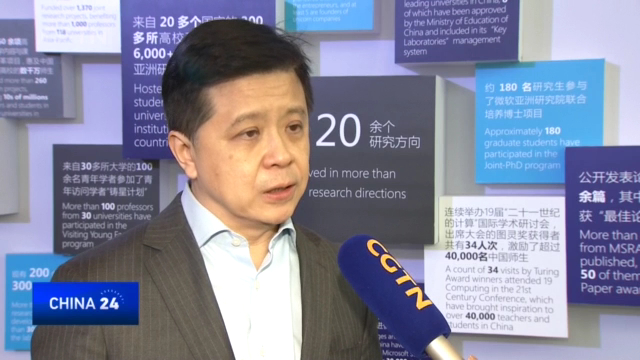
21:35, 08-Nov-2018
China Healthcare: Gov't driving for better services through artificial intelligence
Updated
21:02, 11-Nov-2018
02:28

In China, artificial intelligence is stamping its mark on many different sectors, and none more so than healthcare it seems. Companies from start-ups to tech giants are betting big in the hope this game-changing technology can put some bounce into their profits. CGTN Chuck Tinte has more.
A rapidly aging population is putting a lot of stress on China's health-care system. The Chinese government has been looking to high-technology to resolve the problem. One of the areas it sees real potential and room for growth is artificial intelligence or AI. With most of China's AI healthcare companies currently focused on medical imaging systems.
HSIAO-WUEN HON, MANAGING DIRECTOR MICROSOFT RESEARCH ASIA "As we know, the computer vision is a big part of AI. And in healthcare, looking of the image whether is the X-ray or MRI, we need to get a special doctor spending lots of time to look at the image. Computer vision can provide a lot of help. It's not really trying to replace the doctor, but really make doctor productive. You have already a lot of applications going on in the medical image."
As AI becomes increasingly sophisticated and is integrated more with health-care, training becomes ever more important. Special multi-form platforms are being built to meet this end, for both full-time and reserve personnel. Experts say this will provide more adequate support for scientific and industrial development.
HSIAO-WUEN HON, MANAGING DIRECTOR MICROSOFT RESEARCH ASIA "Workers also need to upgrade their knowledge in AI. We also will use this platform to provide the training certification to make sure the existing workers are well educated and can process necessary knowledge in AI."
Chinese President Xi Jinping has highlighted the need for technological innovation many times in the past, underscoring AI in particular. Experts say while advancements in the industry could alleviate China's personnel shortage, its diagnostic accuracy still needs improvement. CGTN, Chuck Tinte, BEIJING.

SITEMAP
Copyright © 2018 CGTN. Beijing ICP prepared NO.16065310-3
Copyright © 2018 CGTN. Beijing ICP prepared NO.16065310-3